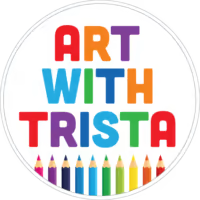Here are some of my favorite Space Art lessons. Space can be a tricky concept for students to grasp but these are projects make it as simple as possible. My elementary-geared ideas are first, with a few ideas for grades 5+ at the end.
Easy Space Collage
This easy collage lesson is the perfect introduction to the element of art space for Kindergarten artists. This lesson also provides Kindergarteners with much needed cutting practice. Students cut a variety of circles in a variety of sizes and glue circles overlapping one another to create the illusion of space. Lastly, my students use white paint to paint “jelly beans” on the circle to create the illusion of a sphere.
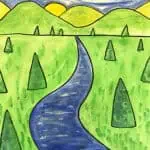
Simple Landscape
First grade artists love this lesson; I think the outcome of this lesson is so impressive. My students draw a path, road or river that leads to the vanishing point. We add trees and objects to the ground to demonstrate how a subject can appear smaller when it is far away.
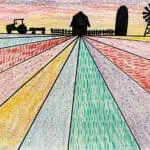
Perspective Farm Field
This lesson is great for 2nd grade, especially if they have created the Simple Landscape the year before. Students draw a horizon line and vanishing point, but this time use a ruler to help them draw several lines that connect the vanishing point and the edge of the paper. The line leading to the vanishing point creates rows of crops that we color with texture rubbing plates to give the illusion of plants. A rural setting is drawn on the horizon, filled in with black to create the illusion of a setting sun.
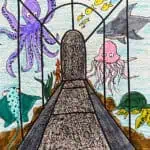
Perspective Aquarium
This perspective lesson is wonderful for 3rd grade artists. They recall what they have learned about 1 point perspective, but this time begin with the bottom portion of a rectangle in the middle of the paper. They connect the corners and end points to the edges of the paper and connect the top with a curved line to create a tunnel. The students add additional vertical lines connected with more curved lines to create the illusion of pieces of glass. Finally they fill the glass area with sea creatures to create the illusion of an aquarium. The results are so fun and unique.
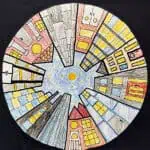
Worm’s Eye View
Another perspective lesson perfect for 3rd grade. Students begin this drawing with a large circle. Then they add a vanishing point in the middle and draw lines from the vanishing point to the edge of the circle to create the outside shape of buildings. Students add windows, doors and other details connecting all the lines to the vanishing point with a ruler to create this illusion of space. This is a fun twist on perspective.
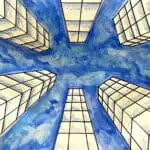
Perspective Skyscraper
This perspective drawing is perfect for 4th grade as it requires more work with the ruler. A vanishing point is placed in the center of the paper and line segments are drawn from the vanishing point. A 90 degree angle is added to the top of each line segment. Additional lines are added to create the sides of the skyscrapers. Shorter line segments are drawn parallel to the 90 degree angle to create windows. Paint and colored pencil are used to create sky and reflective windows. The results are stunning!
Perspective Name
This lesson is a classic, but always a hit with my 5th grade students. I demonstrate how to draw block letters and teach the students how to connect the corners of the letters to the vanishing point to make 3D letters. The letters can appear to be never-ending or I demonstrate how to draw the end of each letter by keeping the line parallel. Shapes can be drawn in the negative space and connected to different vanishing points.
3D Room
I use this for 5th and 6th grade kids. Students use the template to draw the back wall of a room by connecting the points. A vanishing point is added in the middle of the wall and lines are drawn from the vanishing point to make paintings and frames hung on the wall. Lines are also drawn on the top and bottom to create the illusion of ceiling tiles and a wooden floor. Lastly, a sculpture on the floor and a painting on the back wall are added and drawn without using 1 point perspective. I love to make the room an art museum in this lesson, but it could really be any space.
All eight of the above ideas are included in my Elementary Space Art Lessons bundle, available here.
–
SPACE ART LESSONS FOR OLDER STUDENTS
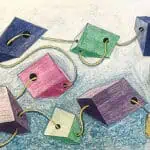
Woven Forms
I love to use this lesson to teach 1-point perspective to my 6th grade students because it reviews the concepts and encourages creativity. I teach my students how to draw a variety of 3D forms. My students choose a theme for their drawing and draw 5-7 floating 3D forms. The connect the forms with a “thread” or something to literally connect the pieces. I am always impressed with the outcome and the options are endless. Lesson plan available here.
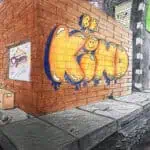
Graffiti Wall
This is a perfect 2-point perspective drawing lesson that is way better than a traditional single building. Students learn how to draw a street corner with multiple buildings. They add interesting details to make the corner seem a little more realistic, such as litter, someone peaking out a window, a sign on a door or graffiti on a brick wall. Students can write their name or a slogan using graffiti style lettering. The end results are amazing, always so much room for storytelling! Check out my Graffiti Wall lesson here.
Thanks for reading! – Trista
Related Posts:
Check out my Elements of Art Lessons and Ideas Page for posts like this.
How to Teach the Elements of Art
If you liked this Space Art Lessons post, please subscribe by clicking here.
